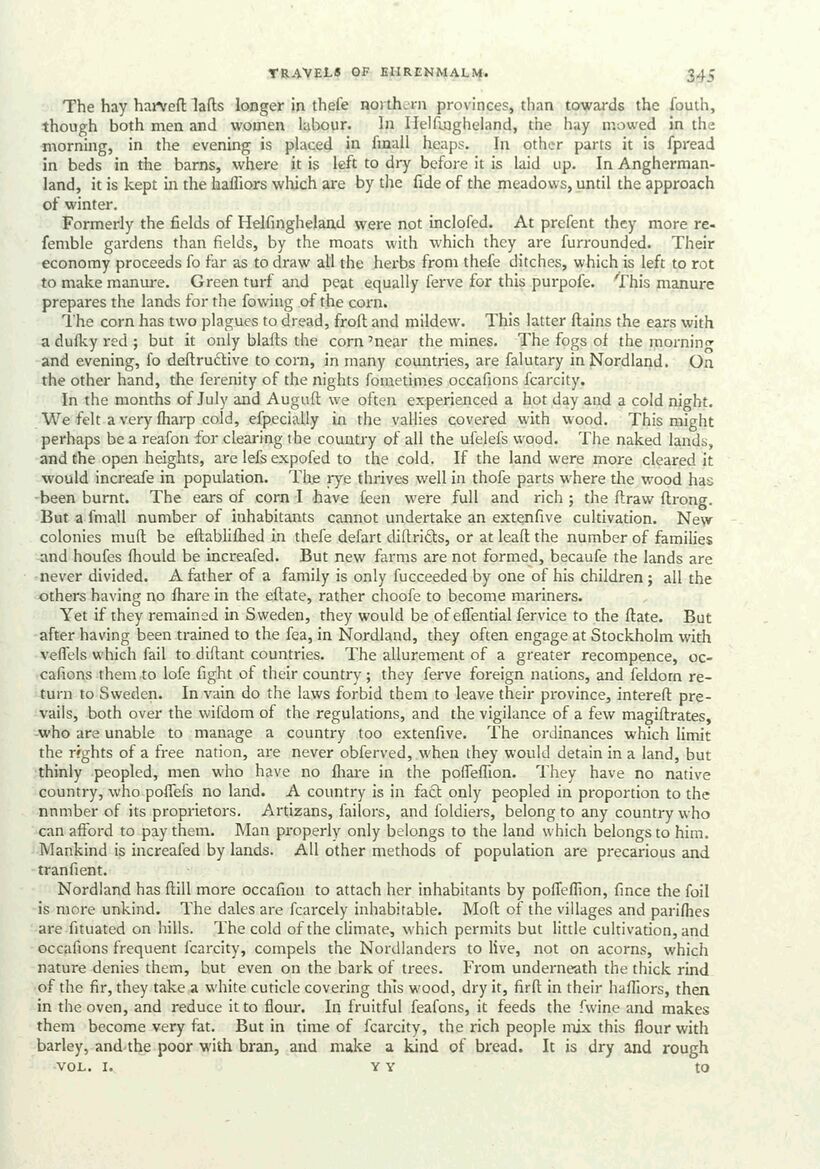
Full resolution (JPEG) - On this page / på denna sida - Pages ...

<< prev. page << föreg. sida << >> nästa sida >> next page >>
Below is the raw OCR text
from the above scanned image.
Do you see an error? Proofread the page now!
Här nedan syns maskintolkade texten från faksimilbilden ovan.
Ser du något fel? Korrekturläs sidan nu!
This page has never been proofread. / Denna sida har aldrig korrekturlästs.
TRAVELS OF EH RENMALM. BAS
The hay harveft lafts longer in thefe northern provinces, than towards the fouth,
though both men and women labour. In Helfingheland, the hay mowed in the
morning, in the evening is placed in fmall heaps. In other parts it is fpread
in beds in the barns, where it is left to dry before it is laid up. In Angherman-
land, it is kept in the hafliors which are by the fide of the meadows, until the approach
of winter.
Formerly the fields of Helfingheland were not inclofed. At prefent they more re-
femble gardens than fields, by the moats with which they are furrounded. Their
economy proceeds fo far as to draw all the herbs from thefe ditches, which is left to rot
tomake manure. Green turf and peat equally ferve for this purpofe. ‘Chis manure
prepares the lands for the fowing of the corn.
Vhe corn has two plagues to dread, froftand mildew. This latter {tains the ears with
adufky red; but it only blafts the corn’near the mines. ‘The fogs of the morning
and evening, fo deftructive to corn, in many countries, are falutary in Nordland. On
the other hand, the ferenity of the nights fometimes occafions {carcity,
In the months of July and Auguft we often experienced a hot day and a cold night.
We felt.a very fharp cold, efpecially in the vallies covered with wood. This might
perhaps be a reafon for clearing the country of all the ufelels wood. The naked lands,
and the open heights, are lefsexpofed to the cold. If the land were more cleared it
would increafe in population. ‘The rye thrives well in thofe parts where the wood has
-been burnt. The ears of cornI have feen were full and rich; the ftraw ftrong.
But afmall number of inhabitants cannot undertake an extenfive cultivation. New
colonies mu{t be eftablifhed in thefe defart diftri€ts, or at leaft the number of families
and houfes fhould be increafed. But new farms are not formed, becaufe the lands are
- never divided. A father of a family is only fucceeded by one of his children; all the
others having no fhare in the eftate, rather choofe to become mariners.
Yet if they remained in Sweden, they would be of effential fervice to the ftate. But
-after having been trained to the fea, in Nordland, they often engage at Stockholm with
veflels which fail to diftant countries. The allurement of a greater recompence, oc-
cafions them to lofe fight of their country; they ferve foreign nations, and feldom re-
‘turn to Sweden. In vain do the laws forbid them to leave their province, intereft pre-
‘vails, both over the wifdom of the regulations, and the vigilance of a few magiftrates,
«who are unable to manage a country too extenfive. ‘The ordinances which limit
the rights of a free nation, are never obferved, when they would detain in a land, but
‘thinly peopled, men who have no fhare in the poffeffion. ‘They have no native
country, who-poffefs no land. A country is in fact only peopled in proportion to the
nnmber of its proprietors. Artizans, failors, and foldiers, belong to any country who
can afford to paythem. Man properly only belongs to the land which belongs to him.
Mankind is increafed by lands. All other methods of population are precarious and
-tranfient. :
Nordland has ftill more occafion to attach her inhabitants by pofleffion, fince the foil
is more unkind. The dales are fcarcely inhabitable. Mott of the villages and parifhes
‘are fituated on hills. ‘The cold of the climate, which permits but little cultivation, and
eccafions frequent fearcity, compels the Nordlanders to live, not on acorns, which
nature denies them, but even on the bark of trees. From underneath the thick rind
of the fir, they take.a white cuticle covering this wood, dry it, firft in their hafliors, then
in the oven, and reduce itto flour. In fruitful feafons, it feeds the fwine and makes
them become very fat. But in time of fcarcity, the rich people mix this flour with
barley,-and-the poor with bran, and make a kind of bread. It is dry and rough
VOL. I. WY to
<< prev. page << föreg. sida << >> nästa sida >> next page >>